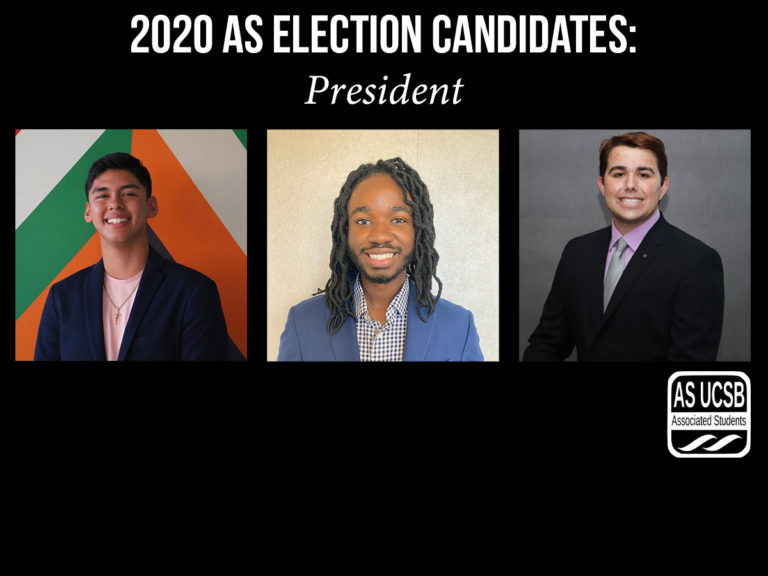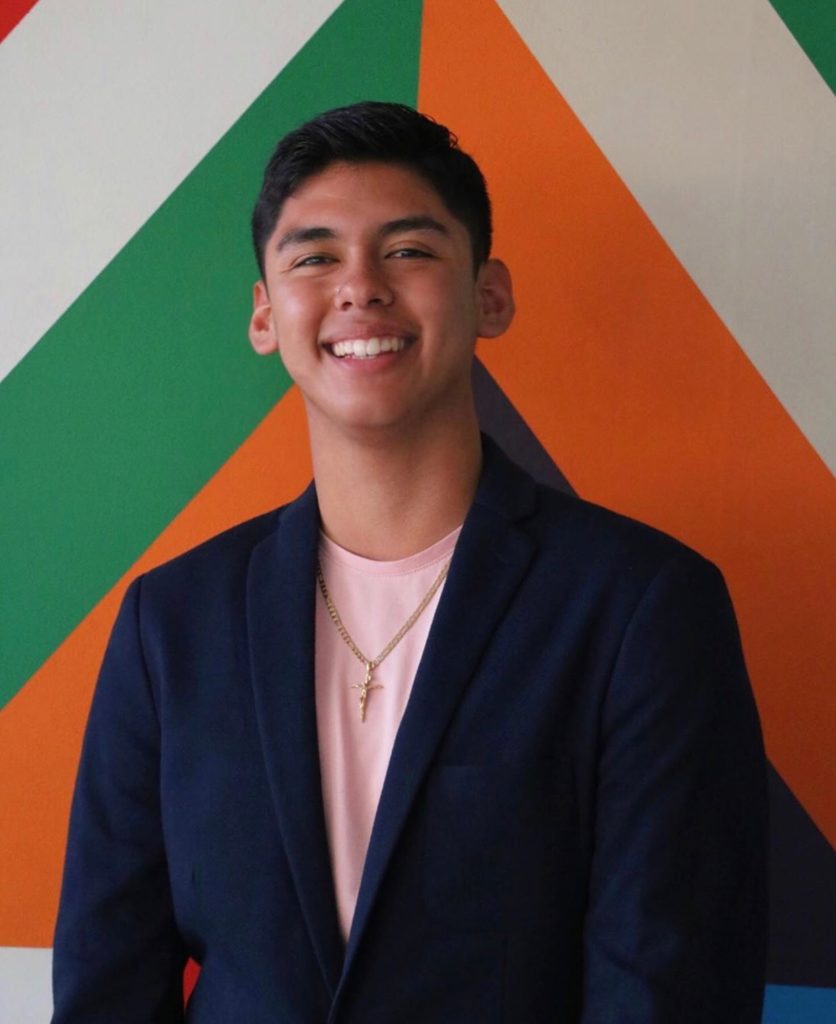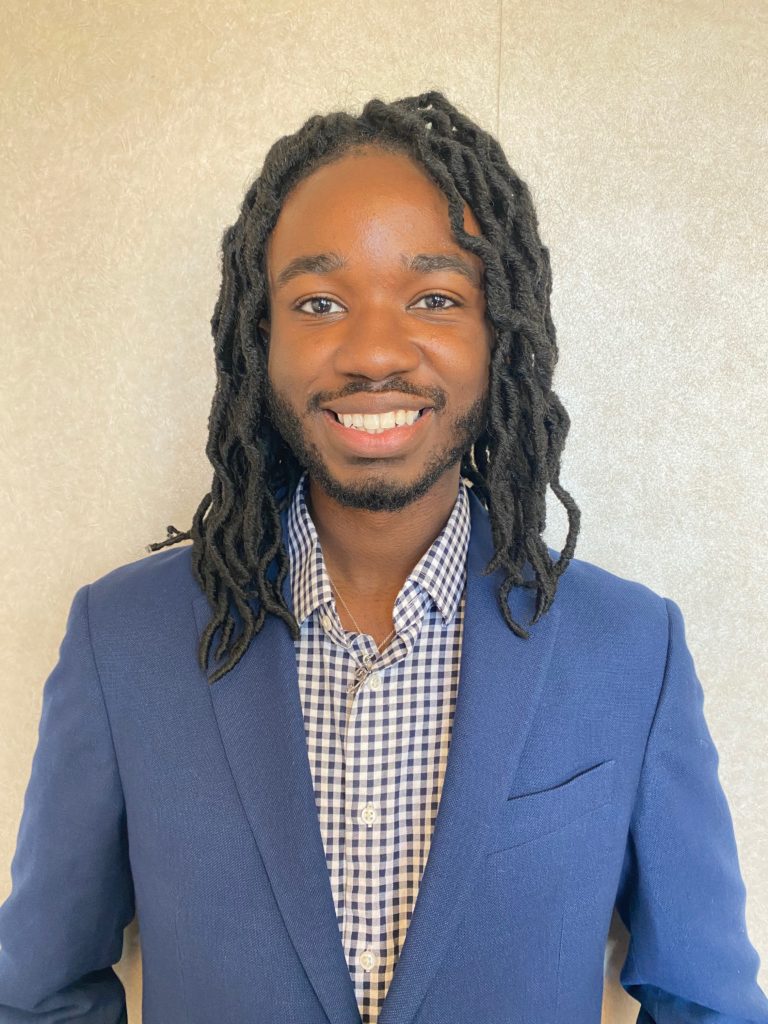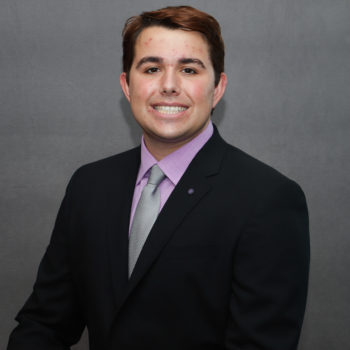

Daniel Segura-Esquivel,
Isla Vista Party
Daevionne Beasley,
Campus United
Austin Foreman, Independent
According to the UC Santa Barbara (UCSB) Associated Students (AS) website, AS exists to “voice student concerns and express student opinion to the UCSB administration, UC system, our community, and state and local governments.” Beginning April 20, UCSB students will be able to vote for a student body president that they feel will best represent their interests and concerns within our campus community.
The three candidates this year include Daniel Segura-Esquivel, a current off-campus senator and third-year sociology major and educational studies minor running under the Isla Vista Party; Daevionne Beasley, UCSB’s current External Vice President for Statewide Affairs (EVPSA) and a third-year sociology major running with Campus United; and Austin Foreman, a pro-temp UCSB senator and second-year biological sciences major running unaffiliated.
According to the AS Elections Code, the AS president’s responsibilities include acting as “chief executive officer” of the Associated Students, serving as a representative for UCSB’s students in campus, system-wide, and local affairs, appointing the chair people of “all boards, commissions, committees, and other agencies,” forming a budget for the Senate, and more.
This is to say that the position is a bit nebulous and entails many opportunities, but few mandates. In an interview with The Bottom Line (TBL), candidate Segura described the office in his words, stating “their place is to be the strongest advocate students have, and addressing their needs with administrators.”
Segura spoke about his desire to build communication and discussion between the administration and the student body, acknowledging that administration will privilege the president’s voice and desires when making decisions regarding students simply because of the title.
According to him, administration doesn’t always understand the needs of students, or know how to address their issues. To this end, Segura built his platform around his communication with student groups and marginalized communities — to listen and hear what they need and relay that to decision-makers, to hold them accountable, and ensure students are taken care of.
Listening to communities and making sure they have the resources they need to be successful is at the heart of Segura’s campaign.
One direct strategy he discussed to provide resources is a school supply vending machine, open 24/7 “even after the bookstore closes” where students can grab Scantrons, blue books, pens, and the like throughout the day.
Along that same track, he mentioned how he intends to finish the current President Allison Sir’s project to bring a healthy-dining vending machine to campus to ensure students always have direct and cheap access to food.
Of course, food and supplies are only the most basic needs a student needs; Segura also repeatedly brought up his desire to reach out to marginalized communities, like Black students, survivors of sexual assault, and first-generation students before they need to reach out themselves.
Segura has already taken on some of this work on in his time as a senator, attending sexual assault town halls, Cost-of-Living Adjustment demonstrations, and the like to make sure he is bringing them the best help he can.
By speaking to these communities, understanding the resources they need, and bringing them into the conversation, Segura hopes to create a better campus community. He points to “breaking out of that AS bubble,” and “bringing unheard voices into discussions they previously weren’t invited to.” These ideas are highlighted via the work he did on as an off-campus senator this year.
Candidate Daevionne Beasley also sees the necessity of bringing resources to students. He cites his previous work, such as allocating student funds towards student-led groups and organizations on campus, and lobbying for summer financial aid in Sacramento in past years.
Advocating for student resources has been important to Beasley’s political career thus far, and he hopes to continue that work as president.
Beasley also points to a desire for transparency regarding student fees, and where they go. “[As EVPSA] I’ve made my budget available to all student organizations as they see fit … like visiting conferences or bringing in speakers … If no one knows about the massive amount of student fees they’re paying and where it’s going, what’s available to them … then I’m not doing my job.”
Beasley also discussed his strong desire to convince Chancellor Yang to withdraw from working on the board to create the Mauna Kea Telescope and to stop the inquisition on Native land in Hawaii.
“People mention the possible scientific advances, but when it comes to the expense of people, especially native people who’ve been the target of persecution for … centuries? Having Yang on that board makes it hard for native students — students of color — to feel comfortable navigating this school, thinking ‘they don’t even care about me, my identity.’”
Beasley believes he is the best candidate for the role because of his years of experience working towards politics and advocacy, mentioning the relationships he’s built with administrators and leaders, and how he wants to continue them.
“Much of my work happened off campus, with faculty and admin only having a small hand in my work — they see my face, my history of advocacy, but now they’ve seen me work. They’ll remember, ‘Hey, this is the student that came to me and asked about getting the transcript fee waived, this is the student that helped get aid for the summer Cal Grant.’”
Austin Foreman is the final candidate for the AS presidency. As a second-year biological sciences major and current on-campus senator, Foreman is on track to graduate early and is the youngest candidate.
Foreman’s main focus as potential president is creating a better mental health care system at our school to ensure students are consistently getting the help they need and that their care grows with them.
“As a Senator, many students have spoken to me about CAPS [Counseling & Psychological Services]. It’s always full, there are constant wait times, and after a few visits, they simply outsource you to another facility — one not always covered by insurance, sometimes including co-pays,” said Foreman. Foreman believes CAPS needs a boost to meet the needs of the entire student population. “It’s already difficult to get the help you need, and with growing over-enrollment, it’ll only get worse.”
Foreman also mentions that current President Sir has made advances towards better mental health services, including collecting a large amount of survey data from the student body. Foreman hopes to use this data to create a true response to student needs.
Foreman also discussed his desire to eliminate the UC system’s move towards a cohort-based tuition model, which would effectively make tuition cost more and more for each new graduating class.
Foreman believes we already pay too much at this university, and feels that this new system would “reduce from the unifying power” students previously had by “separating the graduating classes further.” This would make it harder for students to come together and fight other issues as well.
While seen to some as a junior candidate, Foreman possesses much experience. As second pro-temp of the current senate, he helps run AS Senate meetings, and therefore knows his way around AS legal code. For greater context on Foreman’s contributions in AS Senate, TBL compiled a retrospective on all of the resolutions and bills authored by each Senator this year (in which Foreman is listed under on-campus senators).
He also worked as a liaison for the AS Bike Committee, passed legislation as a senator, and got a head start by beginning work with his Boards Committees and Units (BCU) in the summer before the beginning of the academic year.
Mirroring Segura-Esquivel’s description of the position, Foreman states that it’s a “wonderful opportunity to work with the administration” and mentions the value in “building personal relationships” and “communicating the needs of students” with those in power. According to Foreman, many of these changes must happen at an institutional level, and building a bridge between administration and students is the best way to start.
Voting for the 2020 AS General Election opens on GOLD at 8 a.m. on Monday, April 20. Students will have the opportunity to vote for all of the candidates, including the Office of AS President, until 4 p.m. on Thursday, April 24.
Noe Padilla contributed reporting to this article.










